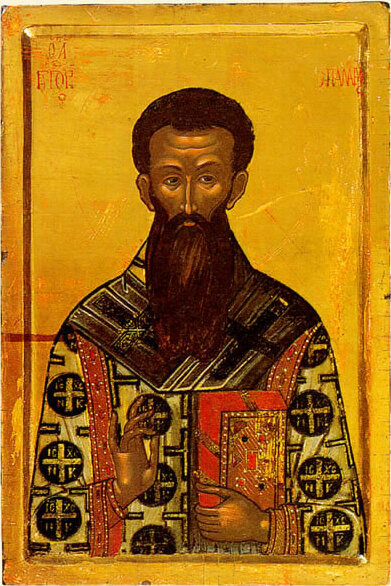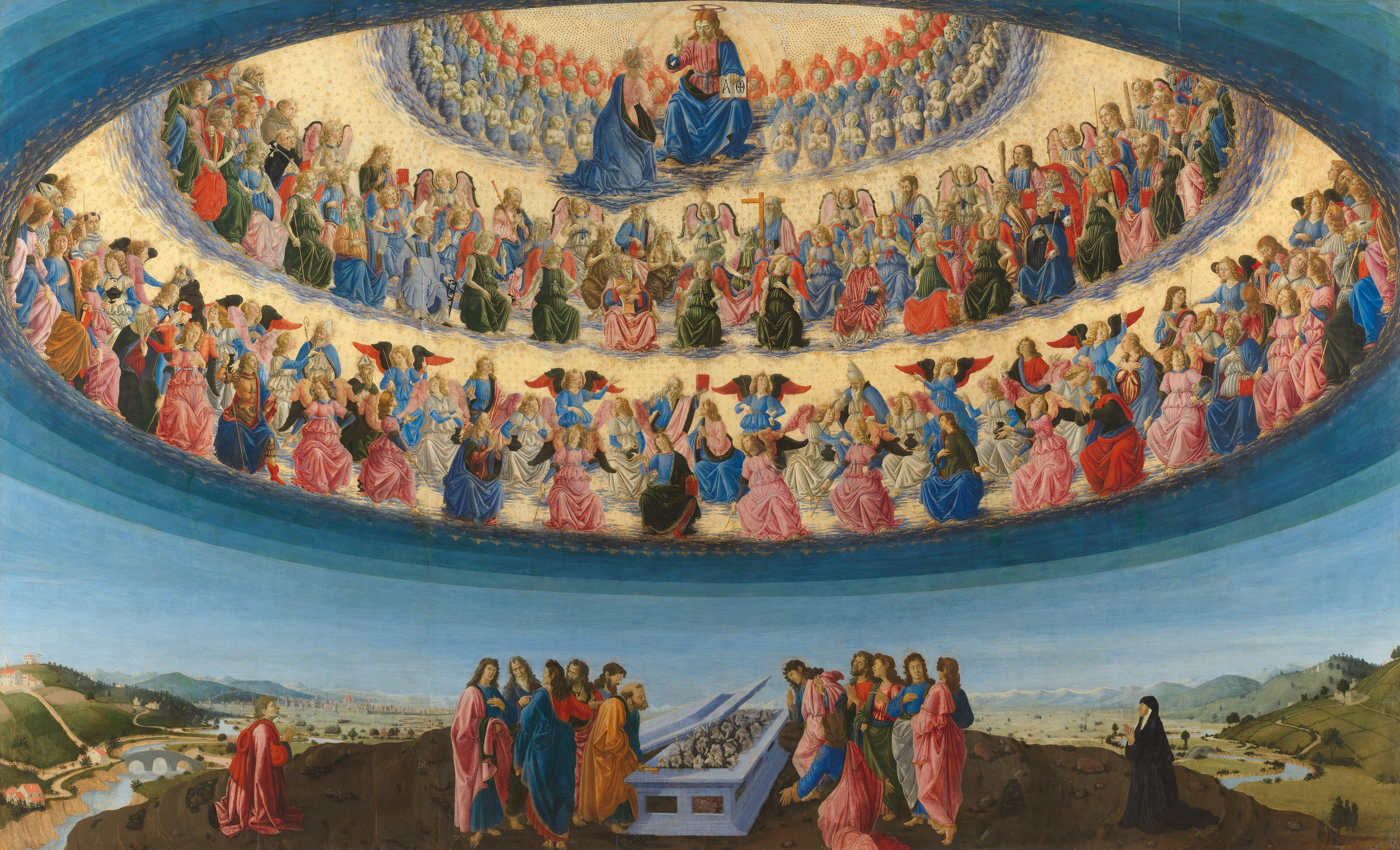|
Emanation In The Eastern Orthodox Church
Emanation (literally "dripping") is a belief, found in Neoplatonism, that the cause of certain beings or states of being consists of an overflow from the essence of God or other higher spiritual beings, as opposed to a special act of creation. This overflow is usually conceived in a non-temporal way as a permanent relationship of causation rather than as an event causing an entity to come into existence at a given point in time. The word "emanation" can refer either to the process of emanation or to the thing emanated. Equivalent concepts are found in Gnosticism and in Kabbalah (Jewish mysticism). This article explores similar concepts in Eastern Orthodoxy and Eastern Catholicism. Concepts The Neoplatonic concept of ''emanation'' can be compared to the statements made by fourteenth-century Eastern Orthodox theologian Gregory Palamas. He drew a distinction between God's ''essence'' and ''energies'', affirming that God was unknowable in His essence, but knowable in His energie ... [...More Info...] [...Related Items...] OR: [Wikipedia] [Google] [Baidu] |
Neoplatonism
Neoplatonism is a strand of Platonism, Platonic philosophy that emerged in the 3rd century AD against the background of Hellenistic philosophy and Hellenistic religion, religion. The term does not encapsulate a set of ideas as much as a chain of thinkers. But there are some ideas that are common to it. For example, the Monism, monistic idea that all of reality can be derived from a single principle, "the One". Neoplatonism began with Ammonius Saccas and his student Plotinus (c. 204/5 – 271 AD) and stretched to the 6th century AD. After Plotinus there were three distinct periods in the history of neoplatonism: the work of his student Porphyry (philosopher), Porphyry (3rd to early 4th century); that of Iamblichus (3rd to 4th century); and the period in the 5th and 6th centuries, when the Academies in Alexandria and Athens flourished. Neoplatonism had an enduring influence on the subsequent history of philosophy. In the Middle Ages, neoplatonic ideas were studied and discussed ... [...More Info...] [...Related Items...] OR: [Wikipedia] [Google] [Baidu] |
Anatolius Of Laodicea
Anatolius of Laodicea (early 3rd century – July 3, 283), also known as Anatolios of Alexandria, became Bishop of Laodicea on the Mediterranean coast of Roman Syria in AD 268. He was not only one of the foremost scholars of his day in the physical sciences as well as in Aristotelean philosophy but also a great computist. Anatolius is considered a saint by both the Eastern Orthodox and the Roman Catholic Church. His feast day, like the one of his namesake Saint Anatolius of Constantinople, is celebrated on July 3. Life Anatolius was born and raised in Alexandria, Egypt, during the early 3rd century. Prior to becoming one of the great lights of the Church, Anatolius enjoyed considerable prestige at Alexandria. According to Eusebius of Caesarea, he was credited with a rich knowledge of arithmetic, geometry, physics, rhetoric, dialectic, and astronomy. Also according to Eusebius, Anatolius was deemed worthy to maintain the school of the Aristotelian succession in Alexandria. ... [...More Info...] [...Related Items...] OR: [Wikipedia] [Google] [Baidu] |
Theosis (Eastern Orthodox Theology)
''Theosis'' ( grc, θέωσις), or deification (deification may also refer to '' apotheosis'', lit. "making divine"), is a transformative process whose aim is likeness to or union with God, as taught by the Eastern Orthodox Church and the Catholic Church. As a process of transformation, ''theosis'' is brought about by the effects of ''catharsis'' (purification of mind and body) and ''theoria'' ('illumination' with the 'vision' of God). According to Eastern Christian teachings, ''theosis'' is very much the purpose of human life. It is considered achievable only through synergy (or cooperation) of human activity and God's uncreated energies (or operations). According to Metropolitan Hierotheos (Vlachos), the primacy of ''theosis'' in Eastern Orthodox Christian theology is directly related to the fact that Byzantine theology (as historically conceived by its principal exponents) is based to a greater extent than Latin Catholic theology on the direct spiritual insights of the sa ... [...More Info...] [...Related Items...] OR: [Wikipedia] [Google] [Baidu] |
Subordinationism
Subordinationalism is a Trinitarian doctrine, where the Son (and sometimes the Holy Spirit included) are subordinate to the Father. Not only in submission and role, but with actual ontological subordination to varying degrees. Subordinationism is defined as hierarchical rankings of the persons of the Trinity, implying ontological subordination of the persons of the Son and the Holy Spirit. Subordinationism was condemned in the second council of Constantinople. Subordinationism is not to be confused with Arianism, as Subordinationism has been generally viewed as closer to the Nicene-Constantinopolitan view. While Arianism was developed out of subordinationism, it did not confess the personality of the Holy Spirit and the eternity of the Son. History Ante-Nicene According to Badcock, virtually all orthodox theologians prior to the Arian controversy in the latter half of the fourth century were subordinationists to some extent This also applies to Irenaeus, Tertullian, Origen, ... [...More Info...] [...Related Items...] OR: [Wikipedia] [Google] [Baidu] |
Palamism
Palamism or the Palamite theology comprises the teachings of Gregory Palamas (c. 1296–1359), whose writings defended the Eastern Orthodox practice of Hesychasm against the attack of Barlaam. Followers of Palamas are sometimes referred to as Palamites. Seeking to defend the assertion that humans can become like God through deification without compromising God's transcendence, Palamas distinguished between God's inaccessible essence and the energies through which he becomes known and enables others to share his divine life.Gerald O'Collins, Edward G. Farrugia. ''A Concise Dictionary of Theology'' (Paulist Press 2000) p186/260 The central idea of the Palamite theology is a distinction between the divine essence and the divine energies that is not a merely conceptual distinction. Palamism is a central element of Eastern Orthodox theology, being made into dogma in the Eastern Orthodox Church by the Hesychast councils. Palamism has been described as representing "the deepest a ... [...More Info...] [...Related Items...] OR: [Wikipedia] [Google] [Baidu] |
Eastern Orthodox Christian Theology
Eastern Orthodox theology is the theology particular to the Eastern Orthodox Church. It is characterized by monotheistic Trinitarianism, belief in the Incarnation of the essentially divine Logos or only-begotten Son of God, a balancing of cataphatic theology with apophatic theology, a hermeneutic defined by a Sacred Tradition, a catholic ecclesiology, a robust of the person, and a principally recapitulative and therapeutic soteriology. Holy Tradition Ecclesiology The Eastern Orthodox Church considers itself to be the one, holy, catholic and apostolic church established by Jesus Christ and his Apostles. The Eastern Orthodox Church asserts to have been very careful in preserving these traditions. Eastern Orthodox Christians regard the Christian Bible as a collection of inspired texts that sprang out of this tradition, not the other way around; and the choices made in the compilation of the New Testament as having come from comparison with already firmly established fai ... [...More Info...] [...Related Items...] OR: [Wikipedia] [Google] [Baidu] |
Neoplatonism And Christianity
Neoplatonism was a major influence on Christian theology throughout Late Antiquity and the Middle Ages in the West. This was due to St. Augustine of Hippo, who was influenced by the early neoplatonists Plotinus and Porphyry, as well as the works of the Christian writer Pseudo-Dionysius the Areopagite, who was influenced by later neoplatonists, such as Proclus and Damascius. Late Antiquity Early Christians including Origen, Gregory of Nyssa, and Augustine were influenced by Neoplatonism, but none accepted it uncritically and they rejected absolute monism and its emanationists' views. Certain central tenets of Neoplatonism served as a philosophical interim for the Christian theologian Augustine of Hippo on his journey from dualistic Manichaeism to Christianity. As a Manichee, Augustine had held that evil has substantial being and that God is made of matter; when he became a Neoplatonist, he changed his views on these things. As a Neoplatonist, and later a Christian, Augustine be ... [...More Info...] [...Related Items...] OR: [Wikipedia] [Google] [Baidu] |
Hierarchy Of Angels
In the angelology of different religions, a hierarchy of angels is a ranking system of angels. Higher ranks have more power or authority over lower ranks, and with different ranks having differences in appearance, such as varying numbers of wings or faces. Abrahamic religions Judaism The Jewish angelic hierarchy is established in the Hebrew Bible, Talmud, Rabbinic literature, and traditional Jewish liturgy. They are categorized in different hierarchies proposed by various theologians. For example, Maimonides, in his ''Mishneh Torah'' or ''Yad ha-Chazakah: Yesodei ha-Torah'', counts ten ranks of angels. Christianity The most influential Christian angelic hierarchy was that put forward by Pseudo-Dionysius the Areopagite in the 5th or 6th century in his book ''De Coelesti Hierarchia'' (''On the Celestial Hierarchy''). Dionysius described nine levels of spiritual beings which he grouped into three orders: *Highest orders *:Seraphim *: Cherubim *:Thrones *Middle orders *:Dominion ... [...More Info...] [...Related Items...] OR: [Wikipedia] [Google] [Baidu] |
Barlaamism
Barlaam of Seminara (Bernardo Massari, as a layman), c. 1290–1348, or Barlaam of Calabria ( gr, Βαρλαὰμ Καλαβρός) was an Eastern Orthodox Greek scholar born in southern Italy he was a scholar and clergyman of the 14th century, as well as a humanist, philologist and theologian. When Gregorios Palamas defended Hesychasm (the Eastern Orthodox Church's mystical teaching on prayer), Barlaam accused him of heresy. Three Eastern Orthodox synods ruled against him and in Palamas's favor (two "Councils of Sophia" in June and August 1341, and a "Council of Blachernae" in 1351). Early life Barlaam was born in what is now the ''comune'' of Seminara, Calabria. Despite the general belief that Barlaam converted to Eastern Orthodox Christianity, Martin Jugie argues that he was in fact of Greek origin, baptized and brought up in the tradition. Early career Bernardo moved to Constantinople in the 1320s, where he soon gained entrance into ecclesiastical and political circles, ... [...More Info...] [...Related Items...] OR: [Wikipedia] [Google] [Baidu] |
Maimonides
Musa ibn Maimon (1138–1204), commonly known as Maimonides (); la, Moses Maimonides and also referred to by the acronym Rambam ( he, רמב״ם), was a Sephardic Jewish philosopher who became one of the most prolific and influential Torah scholars of the Middle Ages. In his time, he was also a preeminent astronomer and physician, serving as the personal physician of Saladin. Born in Córdoba, Almoravid Empire (present-day Spain), on Passover eve, 1138 (or 1135), he worked as a rabbi, physician and philosopher in Morocco and Egypt. He died in Egypt on 12 December 1204, when his body was taken to the lower Galilee and buried in Tiberias. During his lifetime, most Jews greeted Maimonides' writings on Jewish law and ethics with acclaim and gratitude, even as far away as Iraq and Yemen. Yet, while Maimonides rose to become the revered head of the Jewish community in Egypt, his writings also had vociferous critics, particularly in Spain. Nonetheless, he was posthumously ackno ... [...More Info...] [...Related Items...] OR: [Wikipedia] [Google] [Baidu] |
Philip Sherrard
Philip Owen Arnould Sherrard (23 September 1922 – 30 May 1995) was a British author and translator. His work includes translations of Modern Greek poets, and books on Modern Greek literature and culture, metaphysics, theology, art and aesthetics. In England he was influential in making major Greek poets of the nineteenth and twentieth centuries known. He also wrote prolifically on theological and philosophical themes, describing what he believed to be a social and spiritual crisis occurring in the developed world, specifically modern attitudes towards the biophysical environment from a Christian perspective. Biography Philip Owen Arnould Sherrard was born on 23 September 1922 in Oxford. His family had many connections with the literary world of the period: his mother, Brynhild Olivier, had been a member of Rupert Brooke's circle before the First World War and his half-sister was married to Quentin Bell, the nephew of Virginia Woolf. He was educated at Dauntsey's Sc ... [...More Info...] [...Related Items...] OR: [Wikipedia] [Google] [Baidu] |



